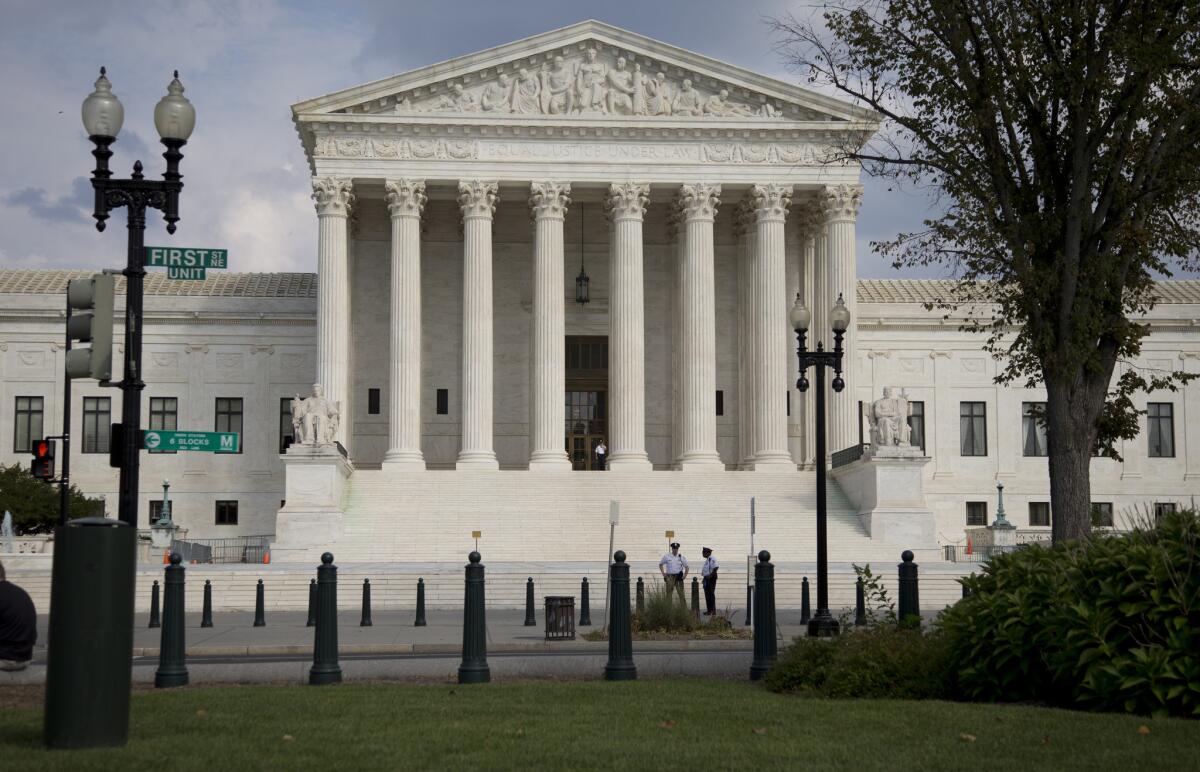Opinion: Another thing the Supreme Court can’t agree on

Maybe you were in a cave and missed the news: The Supreme Court came back from summer recess Oct. 5 and surprised a lot of folks by denying five petitions for writs of certiorari related to same-sex marriage. The court’s “no” amounted to a “yes” – by denying the petitions, it spread legal gay marriage far and wide across the land.
It also spread that word, “certiorari,” far and wide. Writs of certiorari are the everday business of the Supreme Court. Most of its cases come to it via petitions for such writs, which higher courts use to request case files for review from lower courts.
Of course, not every mainstream news source used “certiorari” in its “first Monday in October” reporting. Some talked or wrote around it, turning “denied certiorari” into the simpler “refused to review lower court decisions.” After all, “certiorari” pretty much defines legal jargon.
What’s more, it turns out that even among lawyers, judges and justices, it’s a problem word, something to circle once or twice and approach with caution. There are many things lawyers can’t agree on, and how to pronounce “certiorari” is one of them.
What? Didn’t they all suffer through law school where dispensing such knowledge would seem to be the whole point? They did. But if you’ve ever been on jury duty, traipsing among courtrooms and subjected to the ritual known as voir dire, you are already aware that lawyers do not, cannot talk in one voice: Is that “vwar deer” or “vor deer ay”? Or maybe even “vow die er”?
But back to “certiorari.” The legal quarterly Green Bag has answers, or at least angles to pursue.
The Green Bag is what I would call a notional publication. On the one hand, it’s decorous, even a little fusty, like Atticus Finch’s white suit. On the other, it commissions and distributes bobbleheads of Supreme Court justices, so maybe “decorous” isn’t exactly the right word.
In the Green Bag’s Spring 2014 issue, James J. Duane tackled “certiorari.” He is a professor at the Regent University School of Law and a contributor to Black’s Law Dictionary (8th edition, 2004) where he seems to have edited the legal entries beginning with “C.” Black’s is apparently the go-to source for lawyers, because why should they bother with a dictionary the rest of us use? (My humble Webster’s New World College Dictionary, 4th edition, thinks there is no problem at all with pronouncing this word.)
Duane spends 13 and a half only slightly tongue-in-cheek pages on “certiorari,” with 49 footnotes. He starts by saying that Black’s allows for three pronunciations, at which point you might sigh in relief and stop reading. The source of sources can’t agree so stay calm and choose one.
But Duane resists multi-pronunciationalism. He essentially points out that if the way to say “certiorari” matters at all, it matters in one crucial context: At the Supreme Court, where lawyers will wish to convince at least five justices that they know whereof they speak. As Duane writes, “When a lawyer mispronounces a word, Justice [Antonin] Scalia has warned, the judges are ‘inclined to think this person is not the sharpest pencil in the box.’ ”
The rest of the essay is an exhaustively researched and reported disquisition that doesn’t care which pronunciation is right and fair – cue the lawyer jokes -- so much as which is preferred and by how many justices.
Alas, their preferences do not align. After listening to hours of taped decisions read from the bench (and some oral arguments), Duane unearths five variants among the set of sitting justices (six variants, if you follow him beyond the current lineup to the larger set he calls modern justices). And that means lawyers can’t win for trying with “certiorari.”
“Cautious advocates..,” Duane writes, “must be warned. No matter how you say this word, a majority of justices will think to themselves: ‘That is not how I would have said it.’ ”
So what are the options? Despite its Italianate good looks, “certiorari” doesn’t start with a “ch.” And if you’re thinking your high school Latin will help you, forget about it. This is Law Latin and it departed from the real thing sometime in the Middle Ages, so that isn’t a hard “c” either. Here’s a hint – the only syllable all nine sitting justices agree on is the first. And about it, they are certain.
Follow the Opinion section on Twitter @latimesopinion
More to Read
A cure for the common opinion
Get thought-provoking perspectives with our weekly newsletter.
You may occasionally receive promotional content from the Los Angeles Times.











